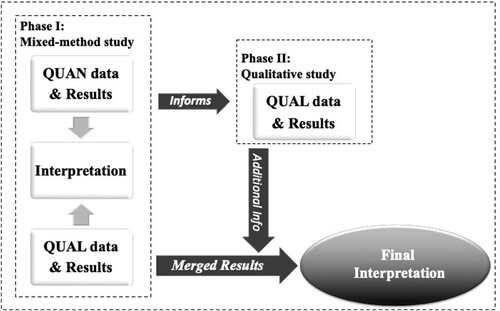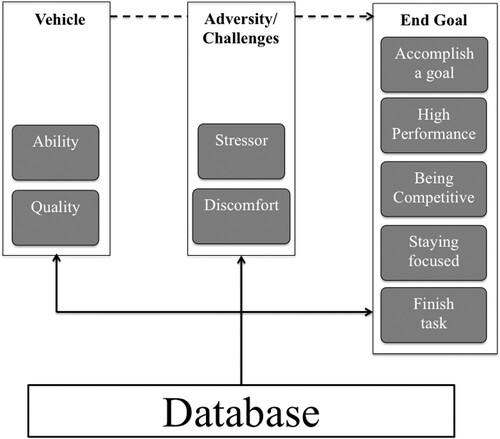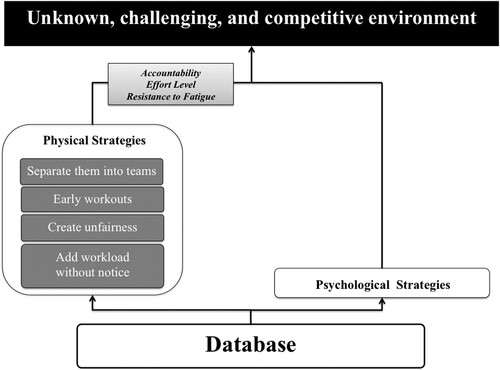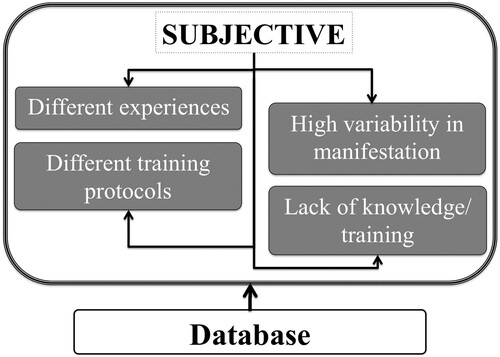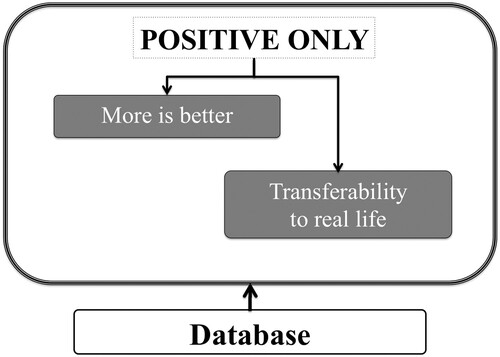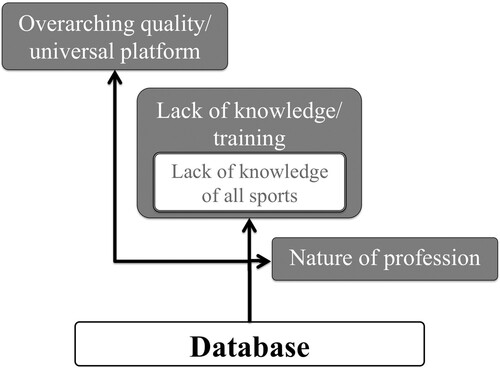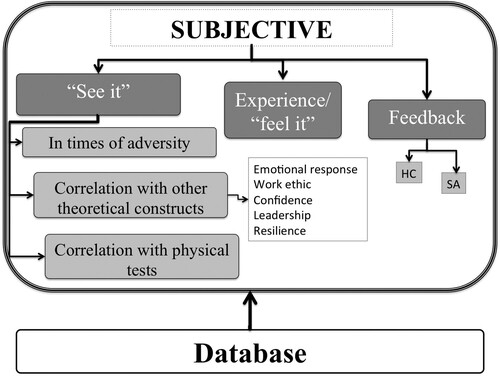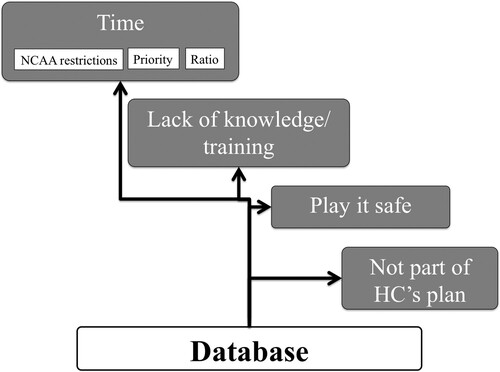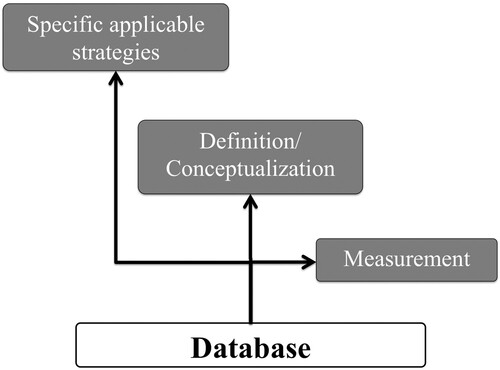ABSTRACT
Coaches are key stakeholders involved in creating a climate in which athletes’ mental toughness (MT) can be developed. Although Master Strength and Conditioning Coaches (MSCC) spend a substantial amount of time working with US collegiate athletes, no studies have investigated this elite group of professionals’ opinions about MT. Using a multiphase mixed-method design (Phase 1, N = 71; Phase 2, N = 28), this study explored MSCCs’ perspectives on the conceptualization, measurement, and training of MT. MSCCs value MT highly and believe that it plays an important role in competitive sports. However, a majority of the participants were uncertain about what constitutes MT. Although MSCCs primarily used anecdotally-based physical protocols to develop athletes’ MT, they rarely assessed the effectiveness of those training approaches using psychometrically-sound instruments. MSCCs highlighted the need to prioritize evidence-based MT training protocols. Resources are required to educate MSCCs and support their work on MT development.
Introduction
In recent years, there has been an increased awareness and consideration of the psychological factors involved in high performance (Gucciardi, Citation2020). Among those factors, mental toughness (MT), a Positive Psychology concept, has frequently been associated with success in a wide variety of activities: from education, to occupation, to the military, to sports.Footnote1
In sports, MT was popularized in the 1980s by Loehr (Citation1982, Citation1986). Despite significant progress since that time concerning MT’s composition and its exact role in athletic performance, basic and applied MT research are still being rigorously criticized due not only to variation in conceptualization and measurement (Liew et al., Citation2019) but also scarcity of evidence-based training protocols (Beattie et al., Citation2020).
Conceptualization
Perspectives on MT vary. Although MT has been highlighted as a necessary attribute in athletic performance (e.g. Mack, Citation2019), there are scholars in the scientific community that even challenge its existence. For instance, Andersen (Citation2011) provided a commentary on whether MT is a separate psychological construct or just an old term with a new label. He presented numerous attributes, characteristics, cognitions, and emotions that had been used to approximate MT, and he pointed out the problem of using absolutist language to describe MT. He also compared MT with Positive Psychology in terms of re-emerging as something “fresh” (Andersen, Citation2011, p. 69). Subsequently, Tibbert and Andersen (Citation2014) suggested that MT may not be so much a personality or characterological phenomenon as much as it might be a product of socio-cultural ideals, norms, and imperatives that are imposed upon athletes and, ultimately, internalized (Tibbert et al., Citation2015; Tibbert & Andersen, Citation2014). Would that be true, most MT research and practice would have little to no use or purpose.
MT has been conceptualized as both a uni-dimensional and multi-dimensional concept. For example, Gucciardi et al. (Citation2015) framed MT as an assimilation of several psychological dimensions that have commonalities, whereas Clough et al. (Citation2002) as the product of related, but distinct, components.
Within these frameworks, MT research falls into two main categories: mechanistic and performance studies. The former typically involves investigating the properties of MT and has supported its existence. As a result, several definitions have been used in the literature (For a chronology, see Gucciardi, Citation2020). Regardless of model, the majority of them so far tend to describe MT as a collection of qualities that allow a sportsperson to successfully confront and overcome negative circumstances. Jones et al. (Citation2002), Gucciardi et al. (Citation2008), and Clough et al. (Citation2002) seem to have gained the most acceptance within the scientific community (Anantasagar et al., Citation2018).
Among the mechanistic studies, MT has also been investigated as a function of behavioral measures and personality traits. In addition, some scholars have employed conceptual replication to test the theoretical proposition of those associations further. For instance, research by Mahoney et al. (Citation2014) showed that individuals’ psychological needs satisfaction is associated with higher levels of MT, while Giles et al. (Citation2018) reported that MT is a salient psychological correlate of behavioral perseverance in an specific aerobic test for Australian football.
Due to limited or contradicting evidence though, many areas of MT research require finer and deeper investigation. That is additional research is needed with respect to potential differences based on sex (e.g. Cowden & Meyer-Weitz, Citation2016; Nicholls et al., Citation2009), the possible negative aspect of MT (e.g. high levels of MT may hinder rehabilitation; Levy et al., Citation2006), inter-sport (e.g. Australian football Mental Toughness Inventory; Gucciardi et al., Citation2009) and inter-position variability (e.g. rugby; Cupples & O'Connor, Citation2011), being a state (Rivera et al., Citation2020) or trait (Weinberg et al., Citation2017), transferability to and from non-sporting environments (Gould et al., Citation2007, Citation2013), and whether it is a characteristic of elite athletes only (Andersen, Citation2011; Caddick & Ryall, Citation2012).
The mere fact that the above category of studies continues to add evidence on MT being a separate psychological construct, would be of minor importance to all stakeholders if MT could not distinguish between bad/suboptimal and good/optimal performance. Performance studies (mainly, cross-sectional; see Stamatis et al., Citation2020) have been conducted to ascertain whether MT can be linked to between- and within-subject differences in competitive and non-competitive indicators of performance (Cowden, Citation2017). For instance, Cooper et al. (Citation2020) found that higher levels of MT were associated with better 800-meter distance running times. Van der Mark et al. (Citation2020) reported a perfect correlation between team MT and final placement during the XIV Men’s Volleyball Pan American Cup. How are these differences in MT measured though?
Measurement
To date, at least twelve such, global- or specific-view, inventories have been used to measure the construct of MT in the sport context, claiming to capture several, sometimes overlapping, key dimensions (for a chronology, see Supplemental Table 1). Choosing a psychometrically-sound instrument is fundamental to assessing the effectiveness of MT interventions and monitoring changes in MT over time. Despite insistent criticisms of the measure (e.g. Gucciardi, Citation2020), the most widely used instrument to assess MT is the Mental Toughness Questionnaire-48 MTQ-48; Clough et al., Citation2007) (Padgett et al., Citation2019).
Training
The ongoing debate on whether MT levels are stable or could fluctuate over time has implications on the likelihood of training/development of MT. Despite the absence of longitudinal quantitative research designs on MT training research (Beattie et al., Citation2020), the environment appears to be a key pre-cursor (e.g. Bull et al., Citation2005) and antecedent (e.g. Thelwell et al., Citation2010) of MT development. While adversity seems to be an irreplaceable environmental component, transparent and clear reporting of MT interventions is uncommon (Beattie et al., Citation2020). Interestingly, the majority of interventional studies have employed psychological over physical training (see Stamatis et al., Citation2020). Coaches seem restricted by the lack of high-quality evidence-based practices (see Stamatis et al., Citation2020).
Coaches perspectives on mental toughness
Most research concerning the conceptualization of MT in sport (e.g. Jones et al., Citation2002; cf. Weinberg et al., Citation2020) and the effectiveness of its training (e.g. self-assessment, limited triangulation via multi-rating; see Stamatis et al., Citation2020) has focused on athletes’ perceptions. Another crucial stakeholder though is the coach.
The modern coach is considered a “performer,” because it is acknowledged that their professional responsibilities keep expanding, including satisfying a wide variety of stakeholders (e.g. fans, parents, agents, sponsors, athletic trainers, players, dietitians, psychologists, media reporters) with potentially conflicting interests (Cropley et al., Citation2020). Besides potentially supporting the need for the coach to be mentally tough themselves, viewing this profession through the lens of a multi-dimensional entity adds on the conviction of its influential role on their athletes. That influential role of the coach has important implications for the development of athletes’ MT (Gould et al., Citation2002).
Strength and conditioning coaches
When it comes to strength and conditioning coaches (SCC),Footnote2 MT research is limited (e.g. Stamatis et al., Citation2018). This gap in the literature is surprising, given the SCCs’ increased significance of role (i.e. “performer”) and the substantial amount of time they spend with athletes. In Division I National Collegiate Athletic Association (NCAA), for instance, SCCs spend more “countable hours”Footnote3 with the athletes throughout the year than the sport coaches. The Collegiate Strength and Conditioning association (CSCCa) is the only strength and conditioning professional organization that claims to be solely committed to the distinctive needs of the collegiate SCC.
Master Strength and Conditioning Coaches. A master strength and conditioning coach (MSCC) is (a) the certified SCC and (b) the active member of the CSCCa, who has been employed as a full-time SCC for at least 12 years (Collegiate Strength & Conditioning Coaches Association, Citationn.d.-b). Being a MSCC is considered to be one of the highest honors in the field because it represents experience, proficiency, and longevity in the profession. The highly-valued opinions of this elite group of professionals have yet to be revealed.
Purpose of current study
The purpose of this study was to investigate, using a two-phase, mixed-method design, the perceptions of MSSCs on three general MT Research Categories: conceptualization, measurement, and training. The study was completed in two, sequential phases. First, using a questionnaire (i.e. STAM II) based on the extant literature, field tendencies, and practice, nine guiding Research Questions (RQ) were explored (see ). Second, eight Emergent Questions (EQ) were examined that arose from the previous phase (see ).Footnote4
Table 2. The research/emergent questions per research category per phase.
Methods and results
A two-phase, mixed-method design was chosen for this study (see ). Based on that sequential framework (i.e. Phase 1 informs Phase 2 before both phases are merged for synthesis; for more information on this specific mixed-method methodological approach, see Creswell & Clark, Citation2017), details about the methods and the results are presented below by phase.
Methods: phase 1
Experimental approach to the problem
Phase 1 followed an observational, cross-sectional design via mixed methods. A mixed-method approach was best suited for the guiding RQs because a single methodology may have been insufficient to provide the robust and complete level of data we sought.
Subjects
Certified MSCCs were the target population (criterion-based, purposive sample). Their 157 email addresses were obtained from the online MSCC directory. We contacted all of them and invited them to participate.
Descriptive characteristics of the first sample (n = 71) are displayed in Supplemental Table 3. MSCCs in the sample were predominantly white males (69.0%) and in the mid-forties (M = 46.4, SD = 6.8). They tended to have a Master’s degree (63.7%) and be certified through the National Strength and Conditioning Association (i.e. CSCS), as well. They mostly worked for a NCAA Division I institution (64.8%), had on average slightly more than 22 years of experience (M = 22.5, SD = 6.3), and their specialty sports were primarily football (42.3%) and/or basketball (35.2%).
Instrumentation
The Stronger Than Average Mentality (S.T.A.M.) II Questionnaire1, which is an updated version of the S.T.A.M questionnaire (Stamatis et al., Citation2018), was used in this study. It consists of 52 items. Prior to administering the questionnaire to the sample of MSCCs, it was given to a group of experts to be evaluated. Eight strength coaches agreed to fill out the questionnaire and provide feedback that was used as evidence for the instrument’s content-related and face validity.
The items included in the instrument were evaluated in light of the RQs and whether the items represented the particular MT RQs. The experts reported that the items adequately collect information about the perceptions of MSCCs regarding MT in sport. Aside from a minor grammatical error, they did not report any issues related to the content, level of complexity, item format, or response format of the items. Based on their suggestions one open-ended item was added (i.e. item 26) to assess MT training issues. Preliminary reliability estimates were computed based on the eight sets of responses. Reliability was estimated using Guttman’s λ2.
Procedures
After the Institutional Review Board (IRB) approval, the questionnaire was uploaded onto Qualtrics (www.qualtrics.com). Using a secure weblink that was sent to all prospective participants, those who agreed to participate first electronically signed the consent form and then completed the questionnaire (Response rate: 45%; Completion rate: 80%).
Data analyses
Quantitative analysis. Descriptive statistics were generated to provide summaries about the sample and the responses to the items addressing the RQ’s within each of the Research Categories (for details, see ).
Table 4. The STAM II items per research question per research category and their corresponding reliability estimates.
Qualitative analysis. Data reduction was the goal of analysis. Therefore, the researchers conducted thematic analysis after downloading the responses from Qualtrics. In more detail, after preparing and organizing the data in appropriate text units, a preliminary read-through was conducted in order to get a sense of the whole before breaking it into parts (Agar, Citation1980). Using “memoing,” key concepts were pinpointed (Creswell & Poth, Citation2016, p. 188).
Three issues about the coding process of this study need to be addressed. First, the numbers of times those codes appeared in the database were not reported in this study. Counting suggests a quantitative emphasis of the analysis, which is conflicting to qualitative research. Moreover, counting implies that all codes are equally important, while neglecting to consider that the text units coded may essentially represent opposing opinions (Creswell & Poth, Citation2016). Second, there were no prefigured categories used to code the data. Instead, emergent categories were viewed as better serving the purpose of this project and its participants. Third, based on the guidelines of Creswell and Poth (Citation2016), the code names – whether in vivo or not – represent: (a) expected, (b) surprising, or (c) interesting or unusual information. After independently conducting the analysis described, the two raters compared codes for inter-rater agreement. The inter-rater agreement percentage for identified codes was 92%.
Results: phase 1Footnote5
ConceptualizationFootnote6
RQ1 – Does MT exist in Sport? When asked about whether or not MT exists, all 71 coaches replied and 67 of the 71 MSCCs (94.4%) indicated “Yes,” they believe MT is a real phenomenon that exists in sport. Thus, it is evident that the vast majority of the MSCCs believe in the existence of the construct in sports.
RQ2 – What is/are the definition/characteristics of MT? Overall, the interpretation of the results suggests that there is no consensus on the specific nature and characteristics of MT (Supplemental Table 5),Footnote7 which led to EQ1 in Phase 2. In general, MSCCs slightly disagree that, on average, high levels of MT could negatively affect student-athletes (M = −0.19, SD = 1.62). These findings form the basis of EQ3 (discussed in Phase 2). Furthermore, MSCCSs do not generally agree about MT being context-, sport-, or position-specific (M = 0.48, SD = 0.97; M = 0.00, SD = 1.85; M = −0.42, SD = 1.65; and M = −0.39, SD = 1.86, respectively), given the variation in means and fairly large standard deviations (guided EQ2).
In terms of common elements of MSSC-provided descriptions, they tended to define MT as the vehicle a student-athlete uses to continuously overcome, handle, and push through adversity and challenges in order to make progress towards an end goal. For instance, one coach defined MT as “Playing through even when things get tough” whereas another coach reported MT to be “The ability to execute precise actions repeatedly regardless of internal or external conditions.” A conceptual model of the MT definitions provided by MSSCs is shown in .
MSSCs strongly associated a lack of MT with a weak mindset. A majority of the participants gave three types of characteristics about the student-athlete who lacks MT. They described them through (1) a “positive quality” that is missing or at low levels, (2) a “negative feature” that they are exhibiting relatively quickly once challenged, or (3) both. The overarching theme was that a weak mindset makes and keeps the athletes unable of reaching any kind of goal. For instance, one coach described the athlete who lacks MT as “[f]irst to fold when things get tough or rough,” whereas another describe a student-athlete who lacks MT as “[s]omeone who quits or gives up at the first difficult obstacle.” A conceptual model of lack of MT, or weak mindset, is presented in .
Figure 3. Layers of analysis for characteristics of student-athletes who lack mental toughness (n = 56).
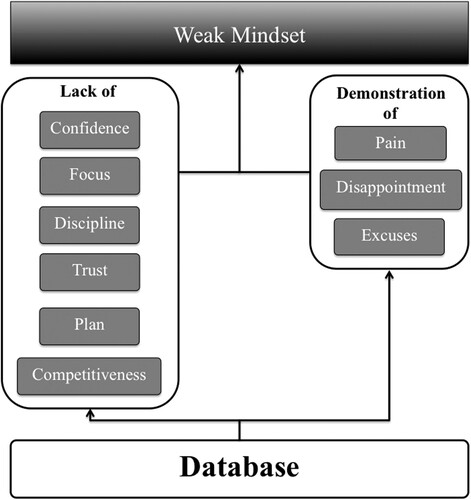
RQ3 – Can MT be developed? Overall, although there is considerable variation in the responses (SD ≥ 1.22 for all items), the overall results suggest that MSCCs view MT as a construct that can be developed (Supplemental Table 6). Among other items, MSSCs reported that MT can be developed in athletes of any age, including athletes aged from 18 to 22 (M = 1.47, SD = 1.54; M = −1.85, SD = 1.42, respectively), by more than 50 percent in four years (M = 54.71, SD = 27.22), which inspired EQ4.
RQ4 – Is MT transferable? Overall, the results suggest that MSCCs tend to agree that MT is transferable to other contexts (Supplemental Table 7). MSSCs reported that MT can be transferred from practice to competition (M = 1.74, SD = 1.28), from sports to personal life (M = 2.06, SD = 0.90), and from personal life to sports (M = 1.96, SD = 0.93).
RQ7 – Are there gender differences in MT? Overall, the results suggested that MSCCs do not perceive gender differences in MT in Sport (Supplemental Table 8). MSSCs reported that both genders are equally tough (M = −.013, SD = 1.04), both genders need the same amount of MT training (M = 0.08, SD = 1.12), the same difficulty levels applies to both genders when it comes to developing MT (M = 0.26, SD = 1.12), and MT makes the same difference for both genders (M = 0.03, SD = 0.89).
Measurement
RQ8 – How is MT measured? Summary statistics for responses to the items addressing the measurement of MT are reported in Supplemental Table 9. Response trends suggested that MSSCs were not well aware of how to measure MT (Item 35), but they did appear to be interested in acquiring access to a psychometrically-sound instrument (Item 38).
Training
RQ5 – What is the overall value of MT? The responses from MSCCs suggest that they perceive MT as having high value in sports (Supplemental Table 10). In fact, MSSCs reported that MT can affect optimal performance by more than 61 percent (M = 61.80, SD = 19.94).
RQ6 – Are MSCCs involved in training MT? Overall, the responses indicate that there is consensus on practicing MT, including training techniques, although they practice less than desired (Supplemental Tables 11 and 12). These findings directed EQ7 in Phase 2.
The layers of analysis for item 26 are displayed in . In general, two types of strategies were identified: physical and psychological. There was a distinct emphasis on physical strategies, which encouraged EQ5 in Phase 2. Interestingly, no details were given about any psychological strategies for MT training. On the other hand, the participants stated specifically that the physical strategies were designed to test their athletes’ accountability, effort level, and resistance to fatigue. MSCCs reported that both types of strategies were implemented in order to prepare the athletes for unknown, challenging, and competitive environments. For instance, when asked to provide an example of MT training, one coach wrote “During a workout most of our lifts have some kind of competition attached to it. It creates an atmosphere where they are always trying to challenge themselves or others on the team.” Another participant described “putting the athletes in situations that make them uncomfortable, things outside of their comfort zone.”
Methods: phase 2
Experimental approach to the problem
The findings from Phase 1 produced a more comprehensive understanding of MT from the perspective of MSCCs, but additional questions emerged as a result. Therefore, a second phase was considered necessary. In Phase 2, qualitative methodology was selected due to the inductive nature of the EQs.
Subjects
Phase 2 targeted the same population and used the same recruitment method as Phase 1. Descriptive characteristics of the sample from Phase 2 (n = 28) are displayed in Supplemental Table 13. The demographics appear very similar to the ones from the sample of the first phase.
Instrumentation
The second questionnaire1 consisted of eight open-ended questions (one for each EQ). Two experts, one psychometrician and one SCC (both with PhDs) with full knowledge of the results of Phase 1 and of the industry, agreed to provide feedback about content-related validity and face validity. No issues were reported.
Procedures
After receiving IRB approval, the same procedure described in Phase 1 was followed (Response rate: 16.5%; Completion rate: 100%).
Data analysis
The qualitative analysis was performed the same way as described in Phase 1. The same two raters examined the data. The inter-rater agreement for the identified codes was 92%.
Results: phase 2
Conceptualization
EQ1 – Why are there different conceptualizations of MT? In general, the overarching theme of the responses is that MT is a theoretical construct and therefore, the nature of its conceptualization cannot be anything else but subjective (“I think the biggest reason is that MT can be a very subjective quality.”). These subjective opinions of the participants stem from four sources (see ):
They may all be Master Coaches, but their previous experiences have affected their perception of MT (e.g. “I’ve known some coaches who say they learned the most about MT from the different sports that they may played or still compete”; “We come from such varied backgrounds [mine is military special operations] into this field”);
MT can be manifested in a lot of different ways (e.g. “In my opinion, MT is revealed differently in different athletes”; “Mental toughness is presented in a variety of ways, thus making how it is defined equally as varied.”);
The fact that are many diverse strategies to increase MT (e.g. “There are those who believe MT can be taught or developed through various S & C protocols and there are those who believe that those same S & C protocols reveal as opposed to developing MT”; “Some use ‘military’ models, others use ‘old school’ models, such as Tough Love, some work with group accountability models, and some use individual accountability”); and
Limited knowledge (e.g. “Most SCCs have knowledge deficit when it comes to training the mind”; “Similar to nutrition knowledge, I can handle some basic aspects, but if it becomes too involved, I am going to bring in my dietitian to assess and help lead fixing the problem”).
EQ2 – Why no negative side of MT? The coaches started by repeating and confirming their strong opinion about MT being positive only (see ). Then, they justified their view by explaining that more MT is always better (e.g. “A student-athlete that is mentally tougher is more likely to push through a workout that is difficult rather than giving up and quitting,” “While most SC will recognize that more is not always better in regard to physical training the same cannot be said for mental toughness. Mental toughness is always looked at as something that must be continually increased and therefore will always be a positive.”) and it can be transferred to real life (e.g. “MT helps athletes turn in assignments on time, study, and operate like good citizens, MT is useful all the time,” “Part of a coaches role is developing their athletes to use the skills and lessons learned in sport and make them applicable to life. Because life does not provide a barometer on the amount of challenges it will throw at you it is hard to put a cap on the amount of MT that can be used to prepare against it.”).
EQ3 – Why general view of MT? Three themes arose from the MSCCs’ answers (see ). First, MT can be transferred and can be manifested in several ways. However, it is still one broad concept (e.g. “MT is viewed as a general skill that has application across many areas,” “MT is operational platform similar to an operating system: It drives day to day choices, drives championships, drives families, drives mundane moments, it is not exclusive to high-level sports or large, aggressive people.”). Second, there is limited knowledge. That includes not only knowledge about MT itself, but also details about the sports in which their athletes are participating (e.g. “MSCCs are not specialized in MT development skills,” “Personally, I work with so many different sports and positions and I don't know the nuances of some of them. If you have never played doubles tennis and only been a lineman with football there are many different mental strategies involved.). Third, the profession has a more general than specific nature because the strength coach is mainly responsible for developing better overall athletes, while the sport coach better athletes for the specific sport/position (e.g. “I think that comes from the strength coach having to look at the entire athlete as a person and part of the overall ‘machine’. Sport coaches see them only as a part of something specific. I think that a lot of our training has been focused on the overall team and not just a specific position, since we are restricted by what implements we can incorporate into our training,” “We, as strength and conditioning coaches, work with a variety of athletes from various sports. We probably tend to look at the similarities of athletes more than the differences.”).
Measurement
EQ6 – How to measure MT? In general, the central theme is that measuring MT is a subjective matter (e.g. “Subjectivity rules the day with MT evaluation,” “We can only hope what we do to increase MT is actually working. It can be very subjective.”). Three subthemes that explain the subjective perception of the MSCCs in regards to measuring appeared (see ). First, (a) measuring through vision in critical times (e.g. “You see it in the results of close games, in hard physically demanding practices that push the athlete to the brink”), (b) in relation to other theoretical structures (e.g. “You know an athlete has it or not based on work ethic,” “You can see a confidence over the course of time when training them”), and (c) in relation to physical tests (e.g. “You just see it. I don’t know how you explain it. When you see an athlete who when they came in a freshman not quit during a drill and give great effort to accomplish the task at hand as opposed to at the beginning of training they would roll over and play dead so to speak you know that athlete has gotten tougher.”). Second, measuring through feelings and experience (e.g. “The art of coaching. You can feel when an athlete begins to ‘get’ it,” “Subjective information from their many years of experience.”). Third, measuring through feedback from the HC (e.g. “Feedback from our sport coaches”) or the student-athlete (SA) (e.g. “Because the feedback they get from their athletes that tell them how much easier it has become to get through various Physical MT activities and how the MT work in the strength program has helped them on the playing field”).
Training
EQ4 – How to develop MT in student-athletes? Three themes surfaced from the MSCCs’ answers (see ). First, there is limited knowledge and training (e.g. “MCSS’s do not understand what MT really is.”). Second, the unique characteristics of the US educational system, which permits individuals to have a dual role, as students and athletes (e.g. “The highly competitive nature of athletes and athletics creates an environment where individuals face adversity in pursuit of their goals on a regular basis. This environment necessitates the development of MT,” “I believe it is related to the overall stress an athlete is exposed to as a collegiate athlete. The athletes still have to deal with the stresses other college students face, but they also the pressure of performing in front of crowds, some small and some on national TV.”). Third, the limited experience of the participants in coaching athletes outside this age range (e.g. “This may be due to our limited focus on the age group of 18-22. Perhaps if we had more exposure to athletes of a larger variety of ages our views may change,” “Possibly because as MSCC's we have a designated time of opportunity within that 18-22-year-old period where we specifically can train MT using our tools as the catalyst.”).
Figure 9. Layers of analysis for reasons for perceived ability to develop MT in student-athletes (n = 28).
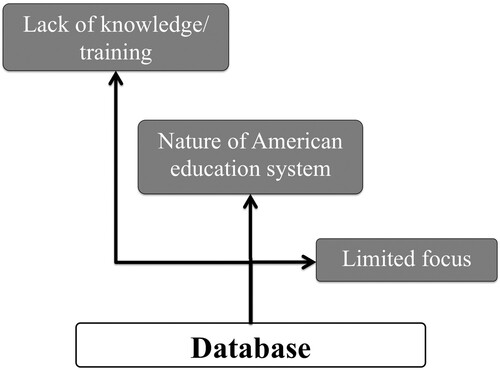
EQ5 – Why choose more physical than psychological strategies to train MT? The MSCCs defended their common practices by emphasizing: (a) their lack of knowledge in psychological strategies (e.g. “MSCC’s are not educated on the strategies,” “SCCs are not well educated in regards to psychology”), (b) the low return on investment (ROI) (e.g. “We have X number of hours with college athletes by NCAA rules. We have to decide on the best way to get our athletes to get work done at the same time as developing MT,” “Physical training keeps it easier,” “Time spent teaching ‘self-talk, relaxation, imagery’ can be thought of as ‘wasted time’ in our limited number of hours -especially by the sport coaches, who may decide our future employment.”), and (c) traditionally not being a part of this position’s duties (e.g. “Prepare them physically is our main job responsibility,” “Those techniques were not used with MSCC’s when they were athletes.”) (see ).
Figure 10. Layers of analysis for reasons for training MT mainly through physiological protocols (n = 28).
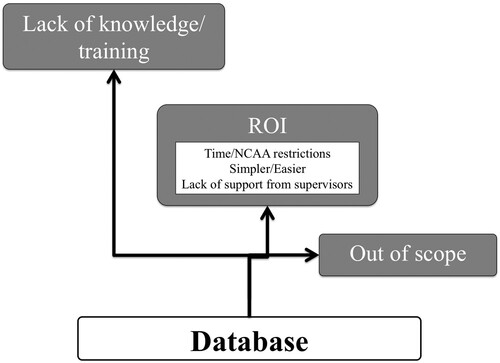
EQ7 – Why is MT trained less than desired? The most prominent theme was time restrictions (see ). These constraints come from (a) the NCAA (e.g. “We have a limited time per NCAA rules,” “Time restrictions placed on them through NCAA regulation”), (b) the fact that pure physical training is the number one priority (“At some point, there just isn’t enough time for everything. Physical attributes and performance get priority,” “Get Strong first. Mental Athletic Development, Nutrition, Flexibility, Recovery, Hydration, Speed, Agility, Quickness, Plyometrics, etc. are secondary focuses”), and (c) the limited number of coaches that have to train a disproportionally larger number of athletes (e.g. “There are too many athletes and too few coaches for each coach to work and address each individual as they need psychologically”). Furthermore, the coaches pointed out that more knowledge is needed (e.g. “Do not understand how to incorporate strategies,” “Not knowing how to implement the necessary psychological skill sets”). Moreover, several coaches commented on the potential risks that MT training may entail (e.g. “In today’s environment -everyone is sue happy or fire happy- you have to be careful how far you take your training,” “I think in today's athlete, they are not as ‘tough’ overall. Society as whole often looks at MT as punishment today. So I think that make us be wary of how much MT training we do and how intense it is.). Lastly, the HCs are not supportive of their MSCC’s will (e.g. “Everything we do has to be run through the head sport coaches’ filter - we must run a program that works within their system,” “They usually do not have enough time from the sport coach to address the many areas S&C coaches are required to influence”).
Future research
EQ8 – What research would MSCCs like to see in the future? These established practitioners identified three kinds of information that would help them in the process of their continuous education and development: (a) specific evidence-based interventions that would support them in their effort to increase their athletes’ levels of MT (i.e. “I want to see research that demonstrates a direct correlation between a type of MT training and actual success or improvement in wins and losses in a competitive environment similar to what we have in college athletics,” “Give examples of tested events and activities that promote MT”); (b) more and clear information about the meaning and the operationalization of the construct (e.g. “Define it,” “Continue to develop a more rich understanding”); and (c) and ways to measure MT (e.g. “Measurement tools,” “Measure it”) (see ).
Discussion
The current study extends existing research on the MT perspectives of various stakeholders involved in shaping the training and developmental experiences of athletes (e.g. Cook et al., Citation2014; Weinberg et al., Citation2011) by offering initial evidence on the perspectives of this elite group of collegiate strength coaches about three MT categories: conceptualization, measurement, and training.
The general pattern of results from the multi-phase mixed-method approach revealed that MSCCs widely endorsed the validity of MT in sport, the influence of MT on sport peformance, and the benefits of MT training. However, perspectives on the conceptualization of MT varied considerably, self-rated knowledge about measurement of MT was limited, and approaches that were used to train MT were typically anchored in anecdotal evidence. The findings suggest that MSCCs play a key role in supporting the MT development of athletes, yet appropriate education and training may be necessary to equip MSCCs with relevant expertise to improve MT training initiatives.
Conceptualization
In contrast with common practice in the MT literature, the authors addressed first the existence of the concept (e.g. jangle fallacy). MSCCs overwhelmingly supported the validity of MT as a unique concept that is applicable to sport, which is fundamental for supporting efforts dedicated to understanding the practical value that may be gained by researching and developing MT.
In general, MSCCs tended to define MT as a means by which an athlete continuously overcomes, handles, and pushes through adversity and challenges in order to make progress towards an end goal. Therefore, MSCCs leaned towards describing MT as a group of personal faculties involved in the surviving, striving, and thriving processes that are commonly associated with MT (Mahoney et al., Citation2014). On the other hand, definitions were heterogenous and generally lacked specificity (e.g. characteristics of mentally tough athletes, features that represent a lack of MT), the coaches had little confidence in their understanding of MT, and there was high variability in the responses of many of the Phase 1 items that addressed the definition/characteristics of MT. Taken together, these findings demonstrate the conceptual imprecision that has been an ongoing issue in the MT literature in sport both in general (see Gucciardi & Hanton, Citation2016) and in the MT research involving US coaches (Wall et al., Citation2020) and US collegiate strength coaches (Stamatis et al., Citation2018).
MSCCs rejected a binary perspective on the traitness of MT and affirmed the developmental capacity of MT, which they even extended to older athletes (i.e. 18–22 years of age), who may be nearing the end of their college sport tenure. These findings align with the widely held belief that MT can develop over time (e.g. Gucciardi et al., Citation2015; Study 4) and the prospect that MT can be trained via targeted interventions (see Stamatis et al., Citation2020).
The perspectives of MSCCs also reflected a belief in the transferability of MT from practice to competition and from sports to personal life, indicating that attempts to improve MT in sport may have positive implications for athletes in other domains. Although research on the transferability of MT is relatively new, the capacity to transfer MT has potential implications for adaptive functioning in various areas of life. If MT is transferable, emphasis should be placed both on developing MT and designing programs that teach athletes how to transfer this skill successfully from one context to the other.
Perceiving MT as a transferable life skill can also justify why MSCCs did not advocate for a specific view of the construct (for an overview of conceptualizations of MT as sport-general or sport-specific, see Cowden et al., Citation2020) or MT having a negative side (“more is always better”; cf. Levy et al., Citation2006). The former is related to the global view of MT and its applicability in a variety of demanding and stressful environments (Wall et al., Citation2020). The latter may be linked to a “no pain, no gain” mentality, which reflects the hypermasculine environments that are often linked to MT (see Tibbert et al., Citation2015).
MSCCs reported that MT is not merely associated with ultimate success (nor is success the only indicator of MT), which is consistent with research that suggests MT might be more closely aligned with psychological (e.g. adaptive coping) and behavioral responses (e.g. perseverance) that improve the likelihood (but don’t guarantee) success (e.g. Cowden, Citation2016; Gucciardi et al., Citation2016). This finding also aligns with a growing body of evidence that underscores that relevance of MT in non-achievement domains (Lin et al., Citation2017). Lastly, another set of interesting findings was that MSCCs (although third-party perceptions) endorsed comparable levels of MT among males and females, unlike those of most previous self-report work (cf. Nicholls et al., Citation2009).
Based on MSCCs’ perspectives, and despite personal bias (e.g. “availability”; Tversky & Kahneman, Citation1974), limited targeted education/available resources, and heavy reliance on anecdotal evidence, the current authors present a working operational definition of MT:
Mental toughness is a transferable life skill, which can be developed at any age and found in all levels of competition. This extremely valuable group of resources (e.g. confidence, discipline, focus) appears similar in all contexts, sports/events, and positions and in both genders. Mental toughness’ key dimensions include coping, resilience, and thriving.
Measurement
The findings of this study suggest that MSCCs rarely utilize psychometrically-validated instruments to measure MT and lack awareness of existing MT instruments. Assessment of athletes’ MT tends to be based on the subjective perspectives of MSCCs and/or other key stakeholders (e.g. HCs) rather than via the use of an objective assessment tool. Beyond the obvious bias that is introduced when subjective approaches are used to evaluate psychological capacities (Monette et al., Citation2013), the practical value of MT training variables (i.e. valid inferences on “frequency,” “intensity,” “time,” and “type”) is likely to be reduced when reliable MT scores are omitted from ongoing evaluations of athletes’ progress.
To improve the safety and effectiveness of MT training protocols in the US collegiate sports, where non-contact injuries (especially, during off-season and under the guidance of SCCs) have been rising (Parsons et al., Citation2019), psychometrically-sound measures of MT need to be integrated into the MT interventions that MSCCs design, develop, and evaluate. Overall, MSCCs perspectives on the measurement of MT highlight the importance of dedicating resources and offering training opportunities to equip MSCCs with the requisite expertise that will enable them to implement high-quality evidence-based MT interventions.
Training
Consistent with earlier studies (e.g. Jones et al., Citation2002), perspectives of MSCCs were overwhelmingly aligned with the notion that MT offers athletes a psychological edge over competitors. MSCCs also indicated that MT can affect optimal performance by more than 61 percentage points and there was consensus that there was value in MT training. Similar views have been identified in prior MT research with SCCs (Stamatis et al., Citation2018), supporting the need for continued investigation dedicated to identifying approaches to train MT. Although MSCCs utilized MT training less than they desired, they did report incorporating MT training into their athletic training protocols. When MT training was attempted, MSCCs generally emphasized physical approaches for training MT. Previous research has proposed physical toughness as an attribute of MT (Gucciardi et al., Citation2008), suggesting that physical strategies may offer a potentially fruitful avenue for training MT, if applied appropriately. However, MSCCs lacked confidence in their understanding of MT and largely implemented MT training approaches without the use of objective assessments to track progress. If MT training strategies used by MSCCs are to be effective and avoid undue harm to student-athletes, structured MT training programs involving an interdisciplinary team of experts (e.g. SCCs, Certified Mental Performance Consultants, sport coaches) will need to be developed and evaluated scientifically.
Limitations and delimitations
Several caveats should be considered alongside the findings of this study. The responses collected are self-reported data, which means that they may be subject to certain types of bias. For example, some coaches may be reluctant to reveal their practicing techniques assuming that there is a high risk of a leak of their “secrets.” Social desirability may have also been present for items, such as whether or not they perceive differences exist in MT in male and female athletes. As a method of minimizing this effect, all responses were anonymous. Furthermore, although both questionnaires were assessed for content-related validity and face validity and S.T.A.M. II was piloted, there is limited evidence for the reliability of the results and the validity of inferences drawn from the data (e.g. high variation of MSCCs’ responses throughout this study). Concerning the latter, although the psychometric evidence provided from the pilot and full sample were positive, the interpretation of the results should be done with caution.
Future studies
According to MSCCs’ answers to EQ8, there is a clear need for additional information on the categories of training, conceptualization, and measurement (in that order) of MT. While efforts focused on enhancing conceptual clarity and developing more robust MT instruments has merit, MSCCs appeared to be more concerned with research that is dedicated to specific interventions on the development of MT in their athletes in the unique US educational system (i.e. dual role of student-athlete). In a recent meta-analysis, Stamatis et al. (Citation2020) concluded that a majority of existing MT interventions are psychological and have a moderate/high risk of bias. To advance the practical utility of MT, the quality of empirical interventional research focusing on specific regimens (physical, psychological, or both) must be improved. In addition, the perceptions of SCCs on the relationship between MT and gender should be further investigated, especially with the increased participation of women in high-level sports (e.g. Title IX). Finally, recruitment should also target SCCs from different environments (e.g. competition level, country).
Conclusion
The purpose of this study was to investigate MSCCs’ pespectives on the conceptualization, measurement, and training of MT. For the first time, a mixed-method design was used to collect metric data from these key stakeholders who are involved in training and developing US collegiate athletes.
On average, MSCCs tend to prescribe physical protocols based on anecdotal evidence. Those protocols, whom effectiveness coaches do not assess objectively, are designed to develop a psychological construct that they value but cannot define clearly. Although MT (a) is operationally perceived as a capacity that could foster facilitative behaviors for goal attainment in the face of adversity (important role), (b) could explain up to 62% of the variance in optimal performance (high value), and (c) appears to be used widely in the collegiate strength and conditioning world (high degree of popularity), it remains a very ambiguous term (Stamatis et al., Citation2018).
Measurement and training of a psychological construct are based on its conceptualization (Anshel et al., Citation2019). Consistent with calls made by others (e.g. Gucciardi, Citation2020), the findings of this study highlight the need to improve the conceptual clarity of MT. Academic institutions, professional organizations (e.g. NSCA, CSCCa, AASP), and governing bodies of collegiate athletics (e.g. NCAA) are encouraged to develop regulations/bylaws (e.g. time restrictions for strength and conditioning training, coach/athlete ratio) and improve the availability of resources (e.g. specialized personnel, educational opportunities in Sport Psychology for SCCs) to support the well-being of the participants at every level of participation (e.g. nearly half a million student-athletes; National Collegiate Athletic Association, Citationn.d.). Our recommendation becomes imperative in light of recent tragic events (i.e. death, hospitalization of student-athletes) in which SCCs were allegedly involved (e.g. University of Maryland, University of Houston).
Supplemental Material
Download MS Word (16.9 KB)Supplemental Material
Download MS Word (14.7 KB)Supplemental Material
Download MS Word (14.7 KB)Supplemental Material
Download MS Word (14.6 KB)Supplemental Material
Download MS Word (13.9 KB)Supplemental Material
Download MS Word (14.2 KB)Supplemental Material
Download MS Word (14.1 KB)Supplemental Material
Download MS Word (14.6 KB)Supplemental Material
Download MS Word (16.1 KB)Supplemental Material
Download MS Word (19.5 KB)Supplemental Material
Download MS Word (22.4 KB)Supplemental Material
Download MS Word (19.5 KB)Supplemental Material
Download MS Word (15.7 KB)Disclosure statement
No potential conflict of interest was reported by the author(s).
Correction Statement
This article has been corrected with minor changes. These changes do not impact the academic content of the article.
Additional information
Notes on contributors
Andreas Stamatis
Dr. Andreas Stamatis is an Associate Professor at the Department of Exercise and Nutrition Sciences at the State University of New York at Plattsburgh. He also serves as the Coordinator of the Fitness and Wellness Undergraduate Program and as the Lab Director.
Grant B. Morgan
Dr. Grant B. Morgan is an Associate Professor in the Quantitative Methods graduate program in the Department of Educational Psychology (EDP) at Baylor School of Education (SOE), the Coordinator of the Quantitative Methods specialization graduate programs (M.A. & Ph.D.), and the Associate Dean for Research for the SOE.
Richard G. Cowden
Dr. Richard G. Cowden is a social-personality psychologist and a Psychology Research Associate at The Human Flourishing Program at Harvard University.
Panagiotis Koutakis
Dr. Panagiotis Koutakis is an Assistant Professor in the Department of Biology at Baylor University and the Director of the Clinical Muscle Biology Lab.
Notes
1 The authors use the words sport and sports interchangeably. The choice of the term sport(s) was based on the specific life domain (i.e., collegiate athletics) that MT was investigated in this research project.
2 “The Collegiate Strength and Conditioning Coaching Professional seeks to develop, implement, assess and supervise evidence-based programs that not only improve sport performance but also promote and safeguard the overall health and well-being of the student athlete” (Collegiate Strength & Conditioning association, Citationn.d.-a)
3 A countable athletically-related activity is any activity with an athletics purpose involving student-athletes that occurs at the direction of or supervised by one or more institutional coaching staff members (including SCCs).
4 RQ8 is not grouped under the three research categories. Instead, it served a dual objective: to investigate if the participants would confirm the three general gaps the authors identified in the literature but also shed light on the kind of research that MSCCs would benefit from.
5 The results of each RQ are presented independently.
6 Due to space limitations and focus of this paper, RQ9 results are not reported.
7 The slider scale was anchored by Strongly Disagree (−3) and Strongly Agree (+3).
References
- Agar, M. (1980). Stories, background knowledge and themes: Problems in the analysis of life history narrative. American Ethnologist, 7(2), 223–239. https://doi.org/10.1525/ae.1980.7.2.02a00010
- Anantasagar, T., Abbott, K., Stamatis, A., & Papadakis, Z. (2018). Mental toughness in sport: Moving towards conceptual clarity and consensus. International Journal of Exercise Science: Conference Proceedings, 2(10), 81.
- Andersen, M. B. (2011). Who’s mental, who’s tough and who’s both? In D. F. Gucciardi & S. Gordon (Eds.), Mental toughness in sport: Developments in theory and research (pp. 69–88). Routledge.
- Anshel, M. H., Petrie, T. A., & Steinfeldt, J. A. (2019). APA handbooks in psychology series. APA handbook of sport and exercise psychology (Vol. 1). American Psychological Association. https://doi.org/10.1037/0000123-000.
- Beattie, S., Hardy, L., Cooke, A., & Gucciardi, D. (2020). Mental toughness training. In N. J. Hodges & A. M. Williams (Eds.), Skill acquisition in sport: Research, theory and practice (3rd ed., pp. 255–270). Routledge.
- Bull, S. J., Shambrook, C. J., James, W., & Brooks, J. E. (2005). Towards an understanding of mental toughness in elite English cricketers. Journal of Applied Sport Psychology, 17(3), 209–227. https://doi.org/10.1080/10413200591010085
- Caddick, N., & Ryall, E. (2012). The social construction of ‘mental toughness’–a fascistoid ideology? Journal of the Philosophy of Sport, 39(1), 137–154. https://doi.org/10.1080/00948705.2012.675068
- Clough, P., Earle, K., & Sewell, D. (2002). Mental toughness: The concept and its measurement. In I. M. Cockerill (Ed.), Solutions in sport psychology (pp. 32–43). Thompson.
- Clough, P., Marchant, D., & Earle, K. (2007). Mental toughness questionnaire 48: Technical manual. http://www.aqr.co.uk/sites/default/files/MTQ48%20Technical%20Manual%20Jan%202007.pdf.
- Collegiate Strength & Conditioning Coaches association. (n.d.-a). The S&C Profession. http://cscca.org/about/mission/definition.
- Collegiate Strength & Conditioning Coaches association. (n.d.-b). MSCC Certification Process and Requirements. http://www.cscca.org/certification/mscc.
- Cook, C., Crust, L., Littlewood, M., Nesti, M., & Allen-Collinson, J. (2014). ‘What it takes’: Perceptions of mental toughness and its development in an English premier League soccer academy. Qualitative Research in Sport, Exercise and Health, 6(3), 329–347. https://doi.org/10.1080/2159676X.2013.857708
- Cooper, K. B., Wilson, M. R., & Jones, M. I. (2020). Fast talkers? Investigating the influence of self-talk on mental toughness and finish times in 800-meter runners. Journal of Applied Sport Psychology, 33(5), 491–509. https://doi.org/10.1080/10413200.2020.1735574
- Cowden, R. G. (2016). Mental toughness, emotional intelligence, and coping effectiveness: An analysis of construct interrelatedness among high-performing adolescent male athletes. Perceptual and Motor Skills, 123(3), 737–753. https://doi.org/10.1177/0031512516666027
- Cowden, R. G. (2017). On the mental toughness of self-aware athletes: Evidence from competitive tennis players. South African Journal of Science, 113(1–2), 1–6. https://doi.org/10.17159/sajs.2017/20160112
- Cowden, R. G., Crust, L., Tibbert, S. J., & Jackman, P. C. (2021). Mental toughness development and training in sport. In M. Bertollo, E. Filho, & P. C. Terry (Eds.), Advancements in mental skills training (pp. 28–43). Routledge.
- Cowden, R. G., & Meyer-Weitz, A. (2016). Mental toughness in South African competitive tennis: Biographical and sport participation differences. International Journal of Sport and Exercise Psychology, 14(2), 152–167. https://doi.org/10.1080/1612197X.2015.1121509
- Creswell, J. W., & Clark, V. L. P. (2017). Designing and conducting mixed methods research. Sage publications.
- Creswell, J. W., & Poth, C. N. (2016). Qualitative inquiry and research design: Choosing among five approaches. Sage publications.
- Cropley, C., Thelwell, R., Mallett, C., & Dieffenbach, K. (2020). Exploring sport psychology in the discipline of sports coaching [Editorial]. Journal of Applied Sport Psychology, 32(1), 1–4. https://doi.org/10.1080/10413200.2019.1695295
- Cupples, B., & O'Connor, D. (2011). The development of position-specific performance indicators in elite youth rugby league: A coach's perspective. International Journal of Sports Science and Coaching, 6(1), 125–141. https://doi.org/10.1260/1747-9541.6.1.125
- Giles, B., Goods, P. S., Warner, D. R., Quain, D., Peeling, P., Ducker, K. J., Dawson, B., & Gucciardi, D. F. (2018). Mental toughness and behavioural perseverance: A conceptual replication and extension. Journal of Science and Medicine in Sport, 21(6), 640–645. https://doi.org/10.1016/j.jsams.2017.10.036
- Gould, D., Collins, K., Lauer, L., & Chung, Y. (2007). Coaching life skills through football: A study of award winning high school coaches. Journal of Applied Sport Psychology, 19(1), 16–37. https://doi.org/10.1080/10413200601113786
- Gould, D., Dieffenbach, K., & Moffett, A. (2002). Psychological characteristics and their development in Olympic champions. Journal of Applied Sport Psychology, 14(3), 172–204. https://doi.org/10.1080/10413200290103482
- Gould, D., Griffes, K., & Carson, S. (2013). Mental toughness as a life skill. In D. F. Gucciardi & S. Gordon (Eds.), Routledge research in sport and exercise science. Mental toughness in sport: Developments in theory and research (pp. 163–186). Routledge/Taylor & Francis Group.
- Gucciardi, D. F. (2020). Mental toughness: Taking stock and considering new horizons. In G. Tenenbaum & R. C. Eklund (Eds.), Handbook of sport psychology (4th ed., pp. 101–120). Wiley.
- Gucciardi, D. F., Gordon, S., & Dimmock, J. A. (2008). Towards an understanding of mental toughness in Australian football. Journal of Applied Sport Psychology, 20(3), 261–281. https://doi.org/10.1080/10413200801998556
- Gucciardi, D. F., Gordon, S., & Dimmock, J. A. (2009). Development and preliminary validation of a mental toughness inventory for Australian football. Psychology of Sport and Exercise, 10(1), 201–209. https://doi.org/10.1016/J.Psychsport.2008.07.011
- Gucciardi, D. F., & Hanton. S. (2016). Mental toughness: Critical reflections and future considerations. In R. Schinke, K. McGannon, & B. Smith (Eds.), Routledge international handbook of sport psychology (pp. 439–448). Routledge.
- Gucciardi, D. F., Hanton, S., Gordon, S., Mallett, C. J., & Temby, P. (2015). The concept of mental toughness: Tests of dimensionality, nomological network, and traitness. Journal of Personality, 83(1), 26–44. https://doi.org/10.1111/jopy.12079
- Gucciardi, D. F., Peeling, P., Ducker, K. J., & Dawson, B. (2016). When the going gets tough: Mental toughness and its relationship with behavioural perseverance. Journal of Science and Medicine in Sport, 19(1), 81–86. https://doi.org/10.1016/j.jsams.2014.12.005
- Jones, G., Hanton, S., & Connaughton, D. (2002). What is this thing called mental toughness? An investigation of elite sports performers. Journal of Applied Sport Psychology, 14(3), 205–218. https://doi.org/10.1080/10413200290103509
- Levy, A. R., Polman, R. C. J., Clough, P., Marchant, D. C., & Earle, K. (2006). Mental toughness as a determinant of beliefs, pain, and adherence in sport injury rehabilitation. Journal of Sport Rehabilitation, 15(3), 246–254. https://doi.org/10.1123/jsr.15.3.245
- Liew, G. C., Kuan, G., Chin, N. S., & Hashim, H. A. (2019). Mental toughness in sport. German Journal of Exercise and Sport Research, 49(4), 381–394. https://doi.org/10.1007/s12662-019-00603-3
- Lin, Y., Mutz, J., Clough, P. J., & Papageorgiou, K. A. (2017). Mental toughness and individual differences in learning, educational and work performance, psychological well-being, and personality: A systematic review. Frontiers in Psychology, 8, 1345. https://doi.org/10.3389/fpsyg.2017.01345
- Loehr, J. E. (1982). Athletic excellence: Mental toughness training for sports. Plume.
- Loehr, J. E. (1986). Mental toughness training for sports: Achieving athletic excellence. Penguin Books.
- Mack, M. G. (2019). An examination of the relationship between mental toughness, psychological skills, coaches’ ratings, and athletic performance. Journal of Sport Behavior, 42(2), 142–157.
- Mahoney, J., Ntoumanis, N., Mallett, C., & Gucciardi, D. (2014). The motivational antecedents of the development of mental toughness: A self-determination theory perspective. International Review of Sport and Exercise Psychology, 7(1), 184–197. https://doi.org/10.1080/1750984X.2014.925951
- Monette, D., Sullivan, T., & DeJong, C. (2013). Applied social research: A tool for the human services. Cengage Learning.
- National Collegiate Athletic Association. (n.d.). What is the NCAA. http://www.ncaa.org/about/resources/media-center/ncaa-101/what-ncaa.
- Nicholls, A. R., Polman, R. C. J., Levy, A. R., & Backhouse, S. H. (2009). Mental toughness in sport: Achievement level, gender, age, experience, and sport type differences. Personality and Individual Differences, 47(1), 73–75. https://doi.org/10.1016/J.Paid.2009.02.006
- Padgett, R. N., Morgan, G. B., & Stamatis, A. (2019, August). Measuring mental toughness in sport: Which assessment tool is the most widely accepted? [Poster presentation] Session Presented at the Annual Convention of the American. Psychological Association, Chicago, IL.
- Parsons, J. T., Anderson, S. A., Casa, D. J., & Hainline, B. (2019). Preventing catastrophic injury and death in collegiate athletes: Interassociation recommendations endorsed by 13 medical and sports medicine organisations. Journal of Athletic Training, 54(8), 843–851. https://doi.org/10.4085/1062-6050-54.085
- Rivera, C., Morgan, G., Forsse, J. S., & Stamatis, A. (2020). Mental toughness: Trait or state? A case of female, NCAA Division I soccer players. International Journal of Exercise Science: Conference Proceedings, 2(12), 107.
- Stamatis, A., Grandjean, P., Morgan, G. B., Padgett, R. N., Cowden, R. G., & Koutakis, P. (2020). Developing and training mental toughness in sport: A systematic review and meta-analysis of observational studies and pre-test and post-test experiments. BMJ Open Sport & Exercise Medicine, 6(1), e000747. https://doi.org/10.1136/bmjsem-2020-000747
- Stamatis, A., Robinson, E. L., & Morgan, G. B. (2018). Mental toughness in collegiate strength and conditioning: Widely used, widely misunderstood. International Research in Higher Education, 3(10), 35–50. https://doi.org/10.5430/irhe.v3n2p35
- Thelwell, R. C., Such, B. A., Weston, N. J. V., Such, J. D., & Greenlees, I. A. (2010). Developing mental toughness: Perceptions of elite female gymnasts. International Journal of Sport and Exercise Psychology, 8(2), 170–188. https://doi.org/10.1080/1612197X.2010.9671941
- Tibbert, S. J., & Andersen, M. B. (2014). Overtraining in professional sport: Exceeding the limits in a culture of physical and mental toughness. In M. B. Andersen & S. J. Hanrahan (Eds.), Doing exercise psychology (pp. 233–258). Human Kinetics.
- Tibbert, S. J., Andersen, M. B., & Morris, T. (2015). What a difference a “mentally toughening” year makes: The acculturation of a rookie. Psychology of Sport and Exercise, 17, 68–78. https://doi.org/10.1016/j.psychsport.2014.10.007
- Tversky, A., & Kahneman, D. (1974). Judgment under uncertainty: Heuristics and biases. Science, 185(4157), 1124–1131. https://doi.org/10.1126/science.185.4157.1124
- Van der Mark, M., Flores, P., Barajas, L., Salazar, C., Morgan, G., Forsse, J., & Stamatis, A. (2020). XIV men’s volleyball pan American cup: Team mental toughness correlates perfectly with final placement. International Journal of Exercise Science: Conference Proceedings, 2(12), 46.
- Wall, T., Strycharczyk, D., & Clough, P. (2020). Mental toughness development. In W. L. Filho, T. Wall, A. M. Azul, L. Brandil, & P. G. Ozuyar (Eds.), Good Health and well-being (pp. 483–495). Springer.
- Weinberg, R., Butt, J., & Culp, B. (2011). Coaches’ views of mental toughness and how it is built. International Journal of Sport and Exercise Psychology, 9(2), 156–172. https://doi.org/10.1080/1612197X.2011.567106
- Weinberg, R., Butt, J., Mellano, K., & Harmsion, R. (2017). The stability of mental toughness across situations: Taking a social-cognitive approach. International Journal of Sport Psychology, 48(3), 280–302. https://doi.org/10.7352/IJSP.2017.48.280
- Weinberg, R., Freysinger, V., Vealey, R., & Block, C. (2020). What does it mean to be “mentally tough” as a NCAA division I collegiate coach? Journal of Applied Sport Psychology, 1–21. https://doi.org/10.1080/10413200.2020.1791277

